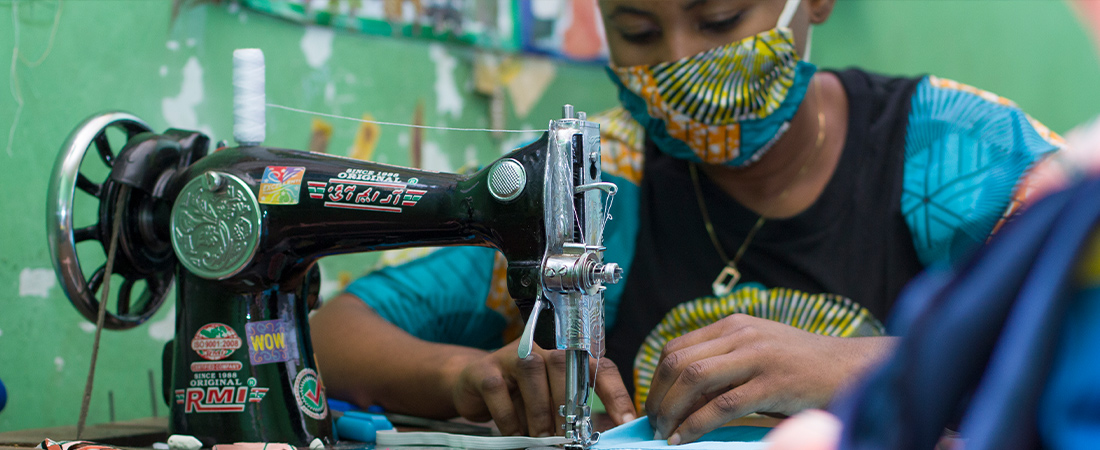Community Threads: Congolese Youth Support Efforts to Stop COVID-19

Soon after the third confirmed case of COVID-19 in the city of Bukavu on April 8, young people in the Democratic Republic of the Congo (DRC) were mobilizing new technical skills and leadership competencies to supply non-medical face masks to local populations, businesses, and international humanitarian and development workers.
These Congolese youth are participants in the U.S. Agency for International Development (USAID) DRC Integrated Youth Development Activity (IYDA) implemented by EDC. As a result of their training, they recognized a unique opportunity to promote positive health messaging and respond to an escalating health and resource crisis in their communities.
With the spread of COVID-19, South Kivu government authorities, like their counterparts the world over, ordered face masks as mandatory when leaving home to mitigate the spread of infection. While those who had access to hospitals and clinics received medical-grade masks, supplies quickly ran out. Pharmacies were not able to meet the demand in Bukavu or surrounding communities for either medical or non-medical grade masks.
COVID-19 was first detected in the DRC’s capital, Kinshasa, in March. It then rapidly spread to the easternmost provinces of North and South Kivu, regions of a country already exhausted by recent Ebola and cholera outbreaks. The DRC has reported 459 cases of COVID-19 to date.
Aimerance, a 19-year-old attending Annunaciata TVET in Bukavu, knew that people’s lives were at stake and that she had both the skills and health knowledge to help others protect themselves. She was not alone. Radio and social media provided Aimerance and her peers with instructions on making non-medical face masks. When combined with proper WASH (water, sanitation and hygiene) messaging, these face masks could be effective in reducing transmission rates among the general population.
“In this difficult period, I am reaching for my optimism,” says Aimerance, during a phone interview. “There was no time to waste,” the sound of a sewing machine emphasizing her point.
In one week alone, 16 IYDA participants, 14 women and 2 men, ages 17–25, produced more than 1,629 face masks. Their endeavor requires a mix of technical skills in tailoring, craftsmanship, marketing, budgeting, and resource mobilization as well as vital competencies in health and safety.
IYDA youth are learning to source whatever cotton, poplin, and traditional cloth is available, working with hospitals to replicate high-quality face mask prototypes that will remain durable after frequent washings and use. They are also making business linkages with soap and disinfectant manufacturers to fulfill increased demand for hygiene demonstrations and products. And they sell their face masks at reduced prices so more people can afford them.
“This is our way of contributing to the fight against the spread of the COVID-19 pandemic in the world and particularly in [Bukavu],” says Nadine, a 22-year-old attending Mwanga TVET Center.
Nadine and the other IYDA youth acknowledge the strong network of mentors they have had from the business and wider community working to support their short- and long-term business strategies.
Since 2018, EDC and its partners—FHI 360, CRS and Souktel—have implemented IYDA to increase the resilience of vulnerable youth. IYDA provides basic education and critical life skills as well as work transition opportunities for youth attending technical and vocational education training centers (TVETs) or living in remote rural areas in the eastern provinces of North and South Kivu.
As a direct result of IYDA efforts, youth are increasing their civic participation and improving their own access to economic engagement, even in the midst of a global health crisis.